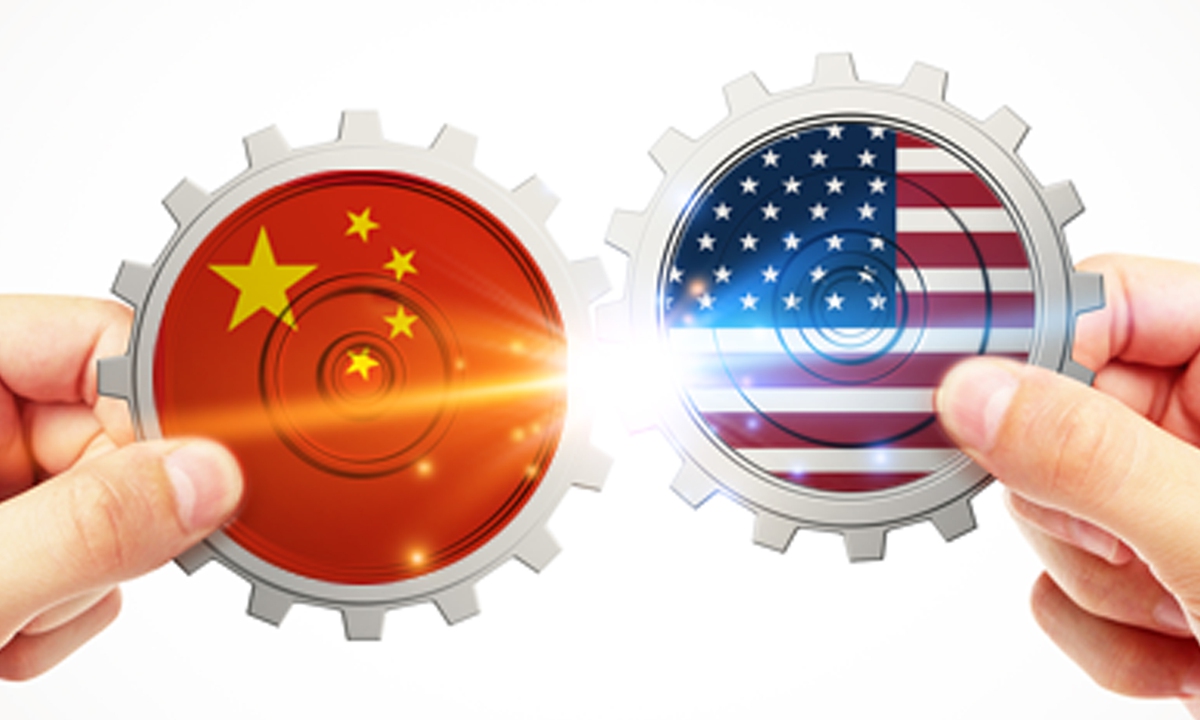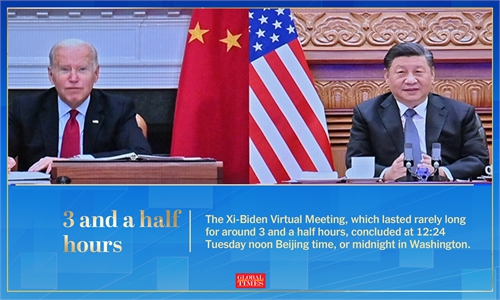
China-US Photo: GT
Editor's Note:Chinese President Xi Jinping and US President Joe Biden concluded their virtual meeting on Tuesday morning (Beijing time). The two leaders held comprehensive and in-depth exchanges on key issues. Why has this meeting been under spotlight? What directions might China-US relations take? Two Chinese experts, Zhu Feng, a professor of international relations at Nanjing University, and Diao Daming, an associate professor at the Renmin University of China in Beijing, shared their views with the Global Times (GT) after the summit.
GT: Why is this summit so significant?
Zhu Feng: The China-US relationship is one between a rising power and a dominant power. There are no fundamental differences between approaches adopted by the Biden or Trump administration against China. Both attempt to isolate and contain China with the help of geopolitical gangs and by means of smearing China and drawing ideological boundaries. This is not acceptable to China at all.
China has made clear its attitude that bilateral cooperation will be hard to achieve if the US insists to handle its relations with China from a position of strength instead of respect. It's significant for now to resume the basic political principle of mutual respect to improve China-US relations.
Today's virtual meeting between the two leaders lasted for more than three hours until midnight in the US with cordial and in-depth exchanges. That was not an easy task for Biden at the age of 79.
Although the two countries can hardly get their ties back on track overnight, the two societies and their political circles have realized that the principle of mutual respect must be recovered to avoid the catastrophe for both peoples' interests and the whole world.
Diao Daming: China-US relations have shown some slight signs of détente. But the most important dynamic that pushes the two countries' ties is undoubtedly the guidance of head-of-state diplomacy. This comprehensive communication is arguably conducive to further stabilizing the two countries' relationship.
President Xi emphasized mutual respect, peaceful coexistence and win-win cooperation - the three principles for China and the US to interact with each other in the new era. Mutual respect is the foundation on which it is possible to manage problems through effective dialogue and thus promote peaceful coexistence, and then establish the landscape of win-win cooperation. This is a highly strategic projection which should be the main path for China-US relations in the future.
GT: How will both countries handle each other's concerns, particularly the Taiwan question?
Zhu Feng: Despite Biden's stated commitment to the "one China" policy, the US will not abandon its manipulation over the Taiwan question, as it is an important domestic political asset. But both sides should clarify their respective bottom lines in terms of policies. The US should stop pouring gasoline on fire and stop going too far playing the "Taiwan card" for the sake of US interests. Instead, it should lower the risks of a showdown in the Straits. The US' excessive claim of unilateral interests would only lead to China's intensified struggle in response. It is a very realistic question for the US: Will it militarily show down against China if the Straits situation is out of control?
Diao Daming: President Xi put forward four priorities for the two countries. Together with the three principles, they show that the two leaders are fully aware of the global nature of China-US relations. To what extent the two countries can get along with each other bears not only interests of the two peoples, but also prospect of shared future for humanity.
The atmosphere has not been sound since the Trump administration launched the trade war against China. Maybe it is the worst since the two established diplomatic ties. Still, the relatively warm atmosphere before and during this summit has shown the world some hope and possibilities of change.
President Biden underscored that the US remains committed to the "one China" policy. But he also put the Three Joint Communiqués together with the so-called Taiwan Relations Act and the Six Assurances as guidance for the policy. Such a narrative has rarely been seen. This reflects that some people in the US are still stuck in a muddle in their outdated thinking and stubbornly cling to their paranoia. These people have a biased or incorrect understanding of these issues.
GT: How will China-US ties develop?
Zhu Feng: It's quite too early to conclude that there have been substantial changes in bilateral relations, but this meeting sends a positive signal. China-US relations in the future are more likely to remain competitive and cooperative at the same time, with the conflicts remaining at a controllable level. Despite the respective interests, both sides should take each other's concerns into consideration and therefore coordinate to make their relations more predictable to reduce potential risks. This also requires self-restraint from the US side from unilaterally making a fuss of the Taiwan question.
Diao Daming: President Xi reiterated managing differences and keeping China-US relations on track. Meanwhile, President Biden echoed underscoring "the importance of managing strategic risks." Head-of-state diplomacy and interaction are mechanisms at the top level to manage differences. In addition, previous calls between senior Chinese and American military officials suggest there are hints of a mechanism in place to prevent derailments.
Although the US still stressed its concerns in a self-serving way, if the two countries can maintain close communication in this context and better recognize the other's concerns, this would also be pragmatic.


